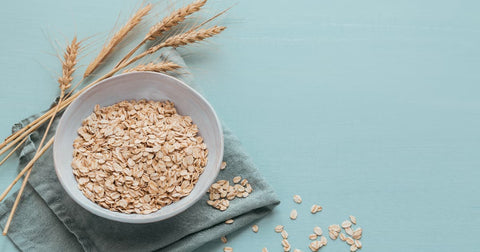Oatmeal, that hearty and wholesome breakfast staple, is celebrated for its numerous health benefits, including its potential to promote digestive health. But amidst its glowing reputation, a question lingers: Can oatmeal cause constipation?
For women between 25 and 65, navigating the complexities of digestive health is crucial for overall well-being. Let's explore this concern, separating fact from fiber, and uncover the truth about oatmeal's impact on your bowel movements.

Does Oatmeal Help With Constipation? The Fiber Connection
Contrary to causing constipation, oatmeal is actually renowned for its ability to relieve it. Oatmeal is rich in soluble fiber, a type of dietary fiber that absorbs water and forms a gel-like substance in your digestive tract. This adds bulk to your stool, making it easier to pass and promoting regularity.
So, the answer to "does oatmeal constipate you?" is generally no, unless there are underlying factors at play.
But Why the Confusion? When Oatmeal Backfires

While oatmeal is typically a friend to your gut, there are a few scenarios where it might contribute to constipation:
- Not Enough Fluids: Fiber needs adequate hydration to work its magic. If you're not drinking enough water alongside your oatmeal, it can actually worsen constipation by making your stool dry and hard.
- Sudden Increase in Fiber: If you dramatically increase your fiber intake, your digestive system might need time to adjust, leading to temporary constipation.
- Individual Sensitivities: While rare, some individuals might experience constipation due to an underlying sensitivity or intolerance to oats or other ingredients in oatmeal.
Can Oatmeal Cause Constipation in Some People? Decoding the Mystery
It's uncommon for oatmeal to cause constipation directly. However, individual responses to dietary fiber can vary. If you experience constipation after eating oatmeal, consider:
- Your Hydration Levels: Are you drinking enough water throughout the day?
- Other Dietary Factors: Are you consuming enough fruits, vegetables, and other fiber-rich foods?
- Potential Sensitivities: Do you experience other digestive symptoms after eating oats, such as bloating or gas?
Food Intolerance: Unveiling the Hidden Culprits
If you experience persistent digestive issues, including constipation, even after adjusting your oatmeal consumption and hydration, an underlying food intolerance might be to blame.
A food sensitivity test can help you pinpoint specific foods triggering your symptoms. By identifying and eliminating these culprits, you can reclaim control of your digestive health and optimize your overall well-being.

Key Takeaways
- Oatmeal is generally beneficial for preventing constipation due to its high soluble fiber content.
- Adequate hydration is essential when consuming oatmeal to avoid potential constipation.
- If you experience constipation despite consuming adequate fluids and fiber, consider underlying food sensitivities.
- A food sensitivity test can help identify trigger foods and guide you towards dietary changes for improved digestive health.
Remember, listening to your body and making informed choices is crucial for optimal health. If you have any concerns about your digestive health, don't hesitate to consult with a healthcare professional.
Frequently Asked Questions:
1. Can I still eat oatmeal if I have IBS or a sensitive stomach?
While oatmeal is generally gentle on the stomach, some individuals with IBS or sensitivities might experience bloating or gas. Experiment with smaller portions and consider overnight oats, which can be easier to digest.
2. What if I experience constipation despite eating oatmeal regularly?
If you're eating plenty of oatmeal and drinking enough water but still experience constipation, there might be another underlying cause. It's advisable to consult a doctor or consider a food sensitivity test to rule out other triggers.
3. Are there specific types of oatmeal that are more likely to cause constipation?
Instant oatmeal, while convenient, often contains added sugars or artificial ingredients that could contribute to digestive issues. Opt for steel-cut or rolled oats for a more natural and fiber-rich option.
4. Can I add toppings to my oatmeal to prevent constipation?
Absolutely! Toppings like fresh fruits, berries, chia seeds, flaxseeds, and nuts can add extra fiber and moisture to your oatmeal, further promoting healthy bowel movements.
5. Besides oatmeal, what are some other foods that help with constipation?
Other fiber-rich foods like fruits, vegetables, legumes, and whole grains can also help prevent constipation. Staying hydrated and incorporating physical activity into your routine are also key.


.png?v=1737390083)
.png?v=1737187409)


